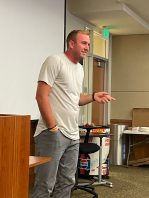
Tennessee football player shares what it’s like to run three businesses while also pursuing master’s degree
 By Tom Ballard, Chief Alliance Officer, PYA
By Tom Ballard, Chief Alliance Officer, PYA
Grant Frerking, a six-year wide receiver on the Tennessee football team, has a lot of moving parts in his life as he shared on Wednesday night during a presentation to the second session of the “Vol Court Speakers Series and Pitch Competition.”
He’s a student athlete from a suburb of Atlanta who also oversees three different businesses that he has launched, the earliest while still in high school. Today, just to make life challenging, Frerking is also pursuing his master’s degree in Management and Human Resources at the University of Tennessee, Knoxville while providing leadership for those ventures.
Drawing on lessons that he has learned since founding his first company in May 2015 at 15 years of age, Frerking provided an eye opener for students who want to be entrepreneurs in terms of the focus, discipline, and commitment that is required to be successful.
“Running a company and playing football is hard,” he said, alluding to what seemed like a regular routine of 20-hour days – rising at 4:30 a.m. and heading to bed around midnight. In between, there were early morning and late evening follow-ups on the companies, football practice, classes and studies.
“There’s a lot of grind and sacrifice that goes into being an entrepreneur,” he observed, but emphasized that it was all worth it in his case.
 “I knew I wanted to be an entrepreneur, but I had no idea what I wanted to do,” Frerking (pictured here from Wednesday’s session) told attendees at the twice-a-year program hosted by the Anderson Center for Entrepreneurship and Innovation in the Haslam College of Business. A conversation with the Director of Grounds at the Wesleyan School in Peachtree Corners, GA, where he was a student, identified the proverbial pain point that every successful start-up needs to understand. In the case of the Director at the Wesleyan School, it was efficiently handling mulch and pine straw, and that need launched Frerking’s first start-up.
“I knew I wanted to be an entrepreneur, but I had no idea what I wanted to do,” Frerking (pictured here from Wednesday’s session) told attendees at the twice-a-year program hosted by the Anderson Center for Entrepreneurship and Innovation in the Haslam College of Business. A conversation with the Director of Grounds at the Wesleyan School in Peachtree Corners, GA, where he was a student, identified the proverbial pain point that every successful start-up needs to understand. In the case of the Director at the Wesleyan School, it was efficiently handling mulch and pine straw, and that need launched Frerking’s first start-up.
Named Metro Straw, it has become one of the largest ground cover solutions companies in the southeast with branches in Atlanta, Nashville, Birmingham and Charlotte. Metro Straw serves both residential and commercial customers, and Frerking expects the company that has 245 employees will generate $12 to $14 million in revenue this year.
To say it was a heady experience might be an understatement.
“I wasn’t able to drive yet,” Frerking said, yet he was running a start-up. When school opened that August, he had to find someone to oversee day-to-day operations and turned to a competitor – roughly 20 years older than Frerking – who is still with Metro Straw.
“Hiring will be your biggest success or failure,” he said to emphasize the point of making good decisions.
In addition to Metro Straw, Frerking also leads two other new ventures, both responding the changing landscape of college athletics resulting from Name, Image and Likeness (NIL). One is GTF Enterprises that helps connect student athletes with business opportunities and offers assistance and expertise in the process including endorsements, engagements, appearances and partnerships. The other is NIL University (NIL U), a branch of On3 that provides resources and a playbook for NCAA student-athletes, their representatives, collectives and colleges to safely and successfully navigate the new frontier of NIL.
Throughout his presentation and in the wrap-up at the end, Frerking shared many insightful points with the students who attended.
- “You will be very uncomfortable at times,” he said.
- Frerking reiterated throughout his presentation the importance of networking, making connections, and treating people right. “Never burn bridges,” he emphasized.
- “You have nothing to lose at your age,” Frerking suggested, noting that it was unlikely that the students had families to support or mortgages to pay. “If you fail, so what? You will have learned a ton of lessons.”
- He said that an important philosophy is to “innovate, adapt but never change,” a specific reference to the entrepreneur’s values and morals. “It’s important to sustain whatever you are doing . . . it’s so easy to quit innovating and adapting.”
- Frerking concluded with what he termed his “Three Biggies”: (1) “Make whatever is on the market better”; (2) “It’s going to be hard as heck as an entrepreneur”; and (3) “Entrepreneurship has nothing to do with comfort, ease or money. You work and earn every dime you make.”
Like what you've read?
Forward to a friend!

